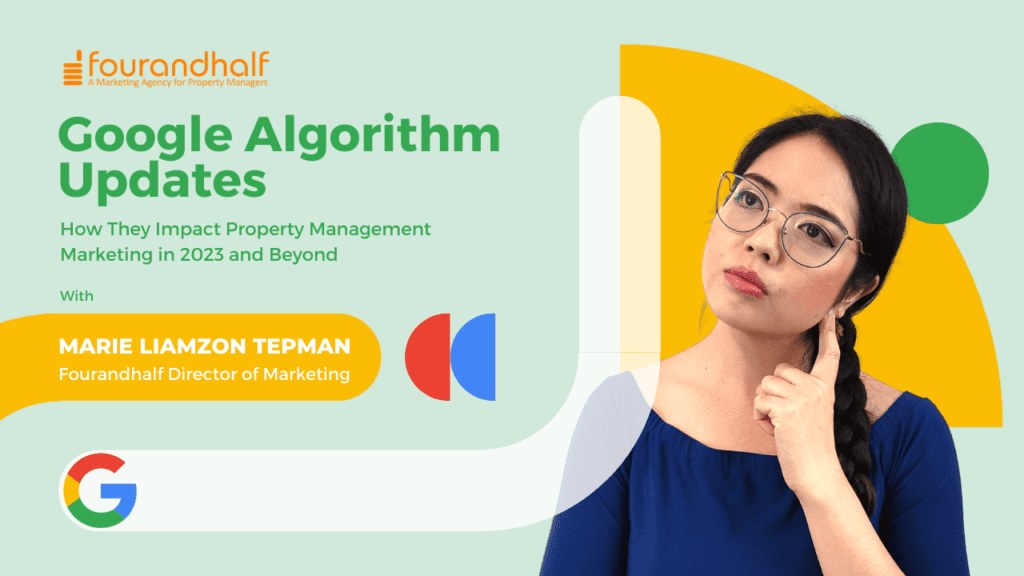
Google continuously updates its algorithm in order to provide the most relevant and useful information to users. By constantly making changes, Google is able to ensure that search engine results pages (SERPs) are up-to-date with content that is both accurate and helpful. With these updates, Google can also limit the amount of spam and low-quality content that can appear on SERPs.
By understanding the changes and what they mean for owner marketing, property managers can stay ahead of their competition and maximize their visibility on Google’s search engine results pages (SERPs). In this article, we will discuss how these recent updates impact property management marketing in 2023 and beyond.
Google’s Role in Property Management Marketing
Although property management marketing has to do with a lot more than your website’s search ranking on Google, it’s undeniable that it has a significant impact.
According to Statista’s data, as of December 2022, Google held an 84.08% share of the global search market, while Bing accounted for 9% and Yahoo had a 2.55% share. In plain English, this means that the majority of searches done online are done through Google.
Property management websites that show up for relevant search terms on Google can have increased web traffic. This is important for property management companies looking to become more visible to prospects online. The higher you show up when rental property owners search for solutions, the more likely they are to click and learn more about you.
But note that not all keywords are created equal. The more relevant a search term is, the more competition you have to face in order to earn the top spot.
According to Google’s How Search Works site, its algorithms are designed and put through a rigorous evaluation process to ensure that they reward content that displays expertise, experience, authoritativeness, and trustworthiness – otherwise known as E-E-A-T. Such content should be original and of excellent quality in order to rank well in search results.
Most Recent Algorithm Updates as of February 2023
Google has recently released two major algorithm updates that property managers and their marketing partners need to be aware of: the Link Spam and Helpful Content Updates. These updates have far-reaching implications for the way residential property management companies market themselves to homeowners online.
Google Search Link Spam Update Explained
Google’s “Link Spam Update” was also released in December 2022 and finished rolling out in January 2023. This update focused on penalizing sites that use link-building tactics that are not considered helpful to users. For residential property management companies, this means that any link-building tactics they use should be aimed at providing useful information and resources to their target audience.
We all get those unsolicited emails about link-building services which claim to be the ticket to the top search rankings on Google. Unfortunately, Google is now cracking down on these services. Businesses that use them could find themselves penalized in the SERPs.
Property managers should stay well away from link-building tactics that are not considered “natural” or helpful to their audience and focus instead on creating quality content to attract organic links from other web pages.
Google’s Helpful Content Update Explained
Similar to the “Link Spam Update,” Google’s “Helpful Content Update” was released in December 2022 and finished rolling out in January 2023. This update focused mainly on rewarding sites that provide helpful, accurate content to users while penalizing those with irrelevant or low-quality content. This means that residential property management companies that produce helpful content tailored to their audiences will now have a better chance of ranking higher on SERPs.
But how does Google define what is helpful content and what is not? Well, it gauges the intent of each piece of content to see if it’s created to help people, or simply to manipulate search engines.
People-First vs. Search Engine-First Content
The top search results on Google are carefully curated to showcase helpful and reliable information that is created with the intention to benefit people, not to increase rankings in the search engine. Automated ranking systems are employed to ensure consistency in the quality of the content displayed.
Gone are the days when you can just insert keywords on your blog or webpage and see results. Today, residential property management companies need to create content that is of excellent quality and provides real value. When crafting such content, property managers should focus on providing helpful information first, followed by optimizing for search engines.
Google even has a whole page dedicated to understanding how to create helpful, reliable, people-first content.
AI-Generated Content on Property Management Websites
After reading the previous section, you might be wondering whether this means that Google prefers only content manually written by humans, for other humans.
The good news is, that’s not the case. But it’s not a simple “yes or no” question either.
In the Google Search Central Blog post dated February 8, 2023, they said that “Appropriate use of AI or automation is not against our guidelines. This means that it is not used to generate content primarily to manipulate search rankings, which is against our spam policies.”
The blog goes on to say that “Our focus on the quality of content, rather than how content is produced, is a useful guide that has helped us deliver reliable, high-quality results to users for years.”
What this means is that, although they won’t penalize the use of AI when creating content, residential property management companies should still make sure that the content created is helpful, accurate, and reliable above all else.
Property managers who want to use AI tools to write their blogs or website copy need to be aware of their limitations and ensure that they don’t rely solely on this technology when crafting content for residents and homeowners.
What Does This Mean for Property Management Marketing?
Marketing a property management company online is now much more difficult than it has ever been. Although there are plenty of tools out there that can help, it takes a lot of work and creative thinking to stand out from the competition.
SEO vs. SEM
It’s important to understand the difference between SEO (Search Engine Optimization) and SEM (Search Engine Marketing) in order for a business to use them effectively.
SEO is a long-term marketing strategy, which means it can take a long time to see the fruits of your labor. This is because it involves optimizing content for search engine algorithms, in order to higher on the SERPs. The Google Algorithm updates discussed in this blog impact SEO rather than SEM.
SEM, on the other hand, is a short-term marketing strategy that focuses on leveraging paid ad campaigns to drive more traffic and conversions. While this method can produce quick results, residential property management companies need to be aware of the high cost that comes with this channel.
You can find a more in-depth explanation in our previous blog post that compared SEO and SEM.
In conclusion, property managers must be very strategic when it comes to their online marketing. This means doing research on what people in your area are looking for in a property manager, creating content that appeals to them, and building relationships with potential clients through networking and education.
Fourandhalf Marketing Agency has helped hundreds of property management companies gain more visibility online over the last decade. Contact us if you need any help getting more owner leads from your marketing. Whether you need help with a website, SEO, online reputation, content marketing, pay-per-click ads, or just establishing a marketing plan, our team is here for you. Fill out the form below to start a conversation with us.

